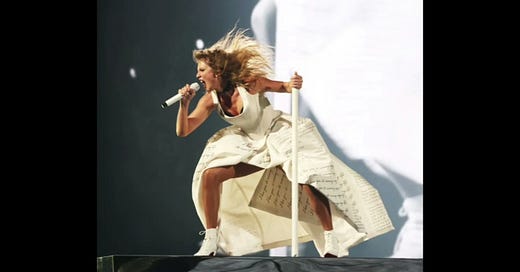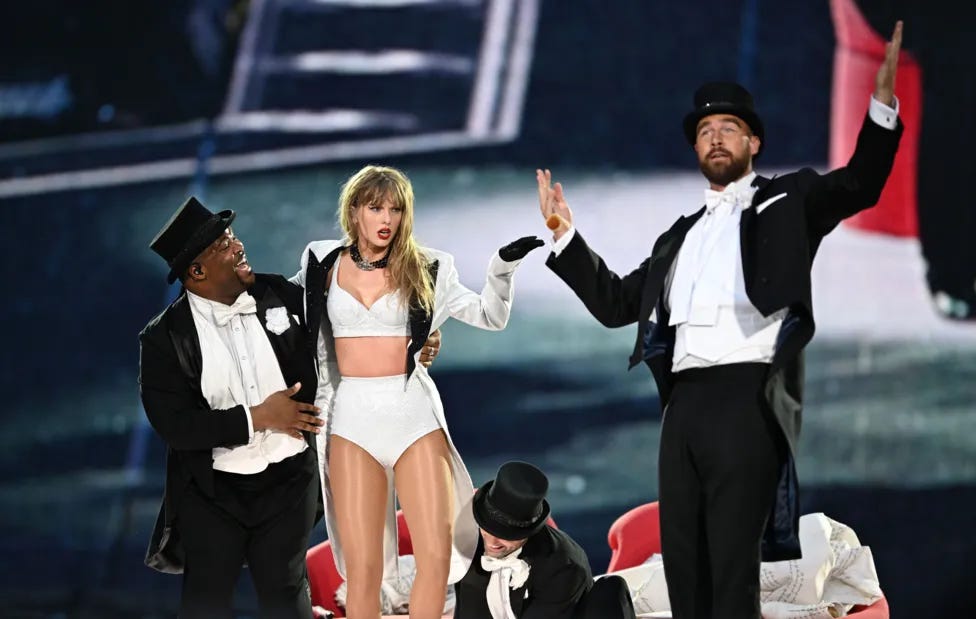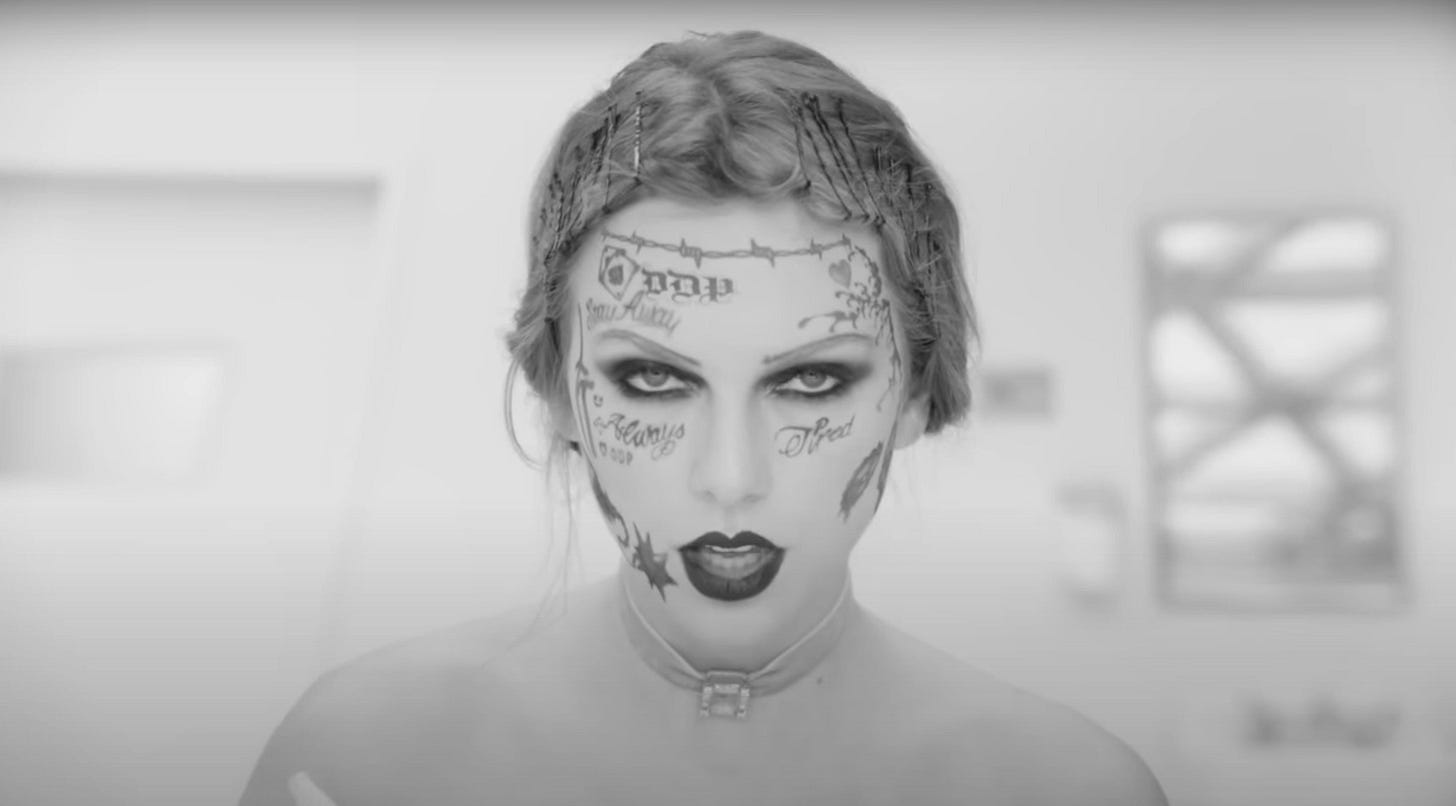I’ve seen Taylor Swift three times now. On the Red Tour ten years ago, which is what turned me into a fan; then on the 1989 tour when she headlined the British Summertime Festival (I was given press tickets, I assume because at the time I was a feminist writer who’d written about my Swift love without having yet become controversial, and Swift was just then beginning to cultivate a feminist edge to her image); and finally last week, on the Sunday of the first Wembley run of the Eras tour.
Red was her transition from folksy girl star to world-straddling pop machine, and not everyone was ready for it: a slightly grumpy Telegraph review from the time complained that the “exuberant stage show drowned out the simplicity of her appeal”, which really meant that the reviewer wanted Swift to stay simple. But she was in her mid-twenties, and even if she could have just about pulled off being the country ingenue, she must have known that standing still would have induced career death within a few years.
Eras makes pragmatic sense — lockdown meant that between her previous tour (for Reputation) and the start of Eras, she had four new albums to take material from (now five with TTPD), and a presentation that gave each of them their own identity is a very smart choice. But there is more to it than that, because there’s always more to Swift. It’s a vindication of her shark-like commitment to always moving forward, forever remaking herself in an endless conversation with her own public profile.
Listened
Taylor Swift, The Eras Tour Official Setlist (Spotify)
And lo, I lost the war with TTPD. I’m not saying I’m ever going to be reconciled to the Anthology Edition — still too long, still too petty — but the Eras tour is pretty powerful propaganda for the good tracks. When you’re watching Taylor float along the catwalk like a mad ghost in a wedding dress roaring out “Who’s Afraid of Little Old Me?”, it really helps to sell the concept of the song. Seeing those songs in the context of Eras also clarifies the feeling that they represent the endpoint of an artistic project. The tour itself has an atmosphere of closure, as Swift celebrates every version of herself so far. Even the secret song sections imply a mad drive to include every possible part of her history.
Watched
Taylor Swift, The Eras Tour (Wembley, 23 July 2024)
She can’t do this again — so she must be planning something else next. As for what that is, well. I saw the show with the grand Travis Kelce reveal, so I might be getting swept up in the pageantry, but bringing a boyfriend on stage feels like a big moment in Taylor lore. It’s not something she would do if she wasn’t very certain about the future of this relationship, and I would be very unsurprised if the Eras tour is followed by a wedding and a couple of years off. And then? Well, whatever happens, she’ll have something new to write about.
When I wrote about Swift’s project of self-creation for Lancet Psychiatry five years ago, I was fascinated by what I think of as her “future breakup” songs (this passage is a close reading of “Tim McGraw”, but it applies equally to “Wildest Dreams” and plenty of other tracks in this vein):
As narrator of the song, she positions herself in two moments simultaneously: the now in which she expects the pain of separation, and a post-separation future in which her ex continues to think about her. It's poignant, because their separate futures are immanent in their uncertain present. It's also controlling, because Swift is crafting herself as a narrative, and ensuring that even though the relationship won't last, her version of it will endure — both in her soon-to-be-ex's memory, and, implicitly, in this song.
Swift is always thinking about what she’ll mean when she’s gone. In her songs, that’s usually an impulse framed through her romantic relationships; in her work, though, her primary relationship is always with her fans. One way to understand Eras: it’s telling us how we should remember her when, or if, she takes a leave of absence from her stardom.
Read
Caroline Criado Perez, “The Pen is In Her Hand” (Invisible Women)
Here’s a thing that is undeniable about a Taylor Swift audience: it’s very, very female. She is, as Caroline writes here, the poet laureate of girl feels. Conventional wisdom would put that down to her breakup songs, and there’s a reason “All Too Well” and “Champagne Problems” are the twin champions of her back catalogue. But in a Taylor song — and this I think is probably why she connects so hard with her audience — the “what happened” part is always less interesting than the question of what story gets told.
The scarf in “All Too Well” matters because “it reminds you of innocence and it smells like me”. The bridge of “Champagne Problems” erupts into that biting interjection from a chorus of assumed onlookers: “She would’ve made such a lovely bride/ What a shame she’s fucked in the head.” All of us are fighting for a version of our own story that we can live with, and women — who have been taught from experience about the fragility of reputation — feel that especially keenly. Taylor, whose fame means she both has more to fight with and more to lose when it comes to controlling her own narrative, knows that better than anyone.
Gimme, gimme more…
This has been a lot of Taylor, but I also wrote for UnHerd this week about the bad pop girlies who are taking over the summer. Charli! Chappell! Olivia! Billie! Renée!
I saw Hamilton for the third time last week and it felt like an elegy for democracy. The presidential debate and the French election that have happened since have not, alas, proved me wrong.
Shout out for Mean Girls at the Savoy, which I saw last week. Absolute bliss. Just make sure you order your interval pink prosecco ahead of time because it’s that kind of show.
Unless the polls are more wrong than they have ever been, Labour will be in power the next time I send one of these. I know I’m not alone in worrying that a government without an effective opposition is a democratic liability, but I’m also very sympathetic to Rob Hutton’s argument for the democratic imperative to give the Tories a complete kicking: in short, they deserve it and it’s the only way they’ll learn.
No notes, this is how it should be done:







“As narrator of the song, she positions herself in two moments simultaneously: the now in which she expects the pain of separation, and a post-separation future in which her ex continues to think about her. It's poignant, because their separate futures are immanent in their uncertain present. It's also controlling, because Swift is crafting herself as a narrative, and ensuring that even though the relationship won't last, her version of it will endure — both in her soon-to-be-ex's memory, and, implicitly, in this song.”
SCORPIO ASCENDING
Indeed, the Tories richly deserve a defeat! Fingers crossed that it’s a crushing one?